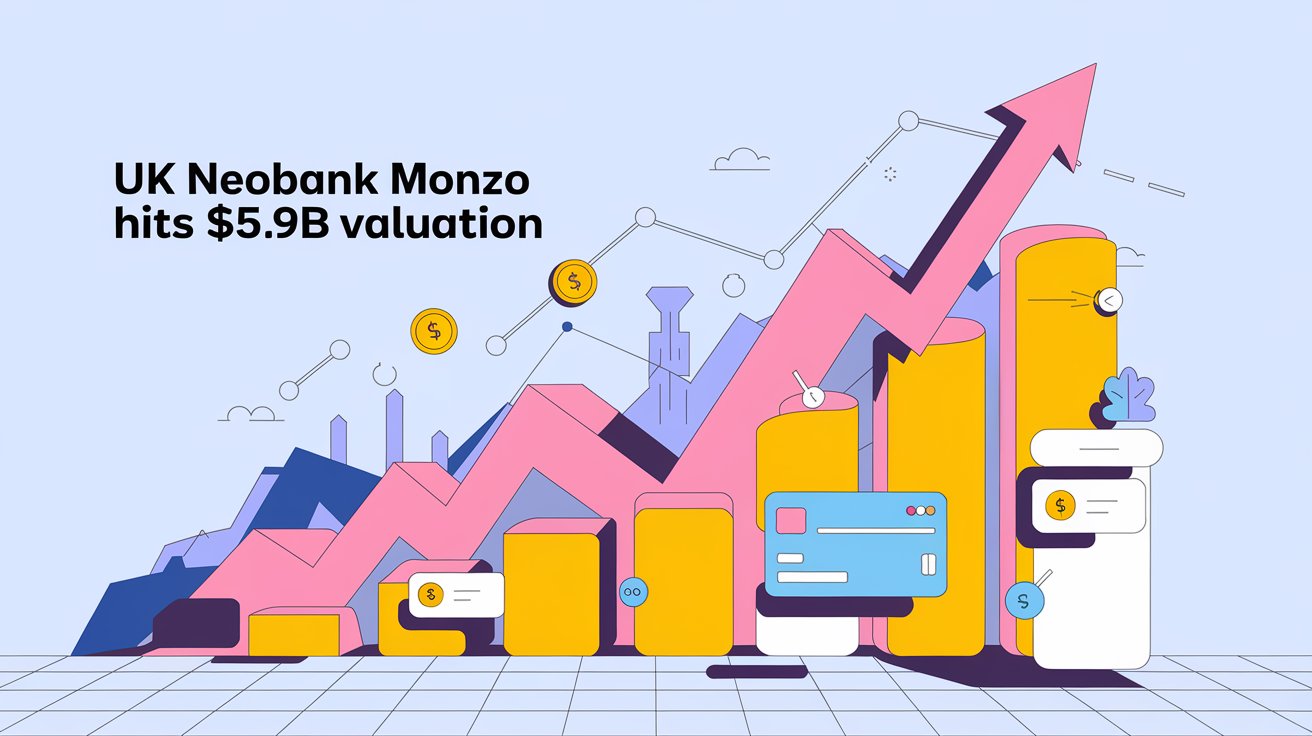In recent years, the fintech industry has seen explosive growth, with several digital banks and neobanks emerging as leaders in reshaping how we manage our finances. Among these, Monzo, a UK-based neobank, has stood out as a key player in the global financial ecosystem. Recently, Monzo hit a remarkable milestone, securing a valuation of $5.9 billion through a secondary market sale. This development not only underscores Monzo’s ongoing success but also highlights the broader trends in fintech and the future of digital banking.
This blog will explore how Monzo reached this valuation, what it signifies for the company and the industry, and the implications for its growth strategy moving forward.
The Rise of Monzo: A Fintech Disruptor
Monzo’s journey began in 2015, when a group of former bankers and tech entrepreneurs came together with the vision of creating a mobile-first bank. Unlike traditional banks, Monzo sought to offer a user-friendly experience, transparency, and real-time updates through its digital app. From the very beginning, Monzo was designed to cater to a generation of users that preferred banking on the go, with services that could be accessed entirely via smartphones.
The neobank quickly grew in popularity, offering features like budgeting tools, spending insights, and zero-fee foreign transactions. By eliminating the need for brick-and-mortar branches and focusing on digital services, Monzo was able to cut costs and offer more competitive products. As it grew, Monzo expanded its offerings to include business accounts, personal loans, and a premium subscription service known as Monzo Plus.
Monzo’s rapid rise in popularity was fueled by its ability to engage with its user base through transparency and community-driven development. Customers played an active role in shaping the app’s features, creating a loyal user base that contributed to the company’s impressive growth.
Understanding Secondary Market Sales
Monzo’s latest $5.9 billion valuation was achieved through a secondary market sale, a type of transaction that occurs when existing shareholders sell their shares to new investors. This is different from primary funding rounds, where a company raises capital by issuing new shares. In a secondary market sale, the company does not directly receive funds, but the sale can help adjust the company’s perceived market value and provide liquidity to early investors or employees who own equity.
For Monzo, this secondary market sale allowed the company to increase its valuation without diluting ownership or issuing new shares. This is a significant advantage as it keeps Monzo’s ownership structure intact while simultaneously boosting investor confidence in the company’s long-term prospects. The rising valuation demonstrates the high level of demand for Monzo shares, reflecting investor confidence in its growth strategy and future profitability.
Key Drivers of Monzo’s Valuation Growth
Several factors have contributed to Monzo’s impressive valuation growth in recent years. These include its expanding product portfolio, strong user base, and continued innovation within the fintech industry.
First, Monzo’s user-friendly platform and innovative features have made it one of the most popular digital banks in the UK, with millions of users who rely on its app for daily banking needs. The company has continuously added new services, including Monzo Business, which caters to small and medium-sized enterprises (SMEs). Monzo’s ability to diversify its offerings and expand its user base across different demographics has positioned it for long-term success.
Second, Monzo has capitalized on the growing trend of cashless transactions, digital payments, and contactless banking. As consumers increasingly turn to online and mobile banking solutions, Monzo has been able to tap into a fast-growing market segment. The convenience of its app and features, such as instant spending notifications and savings tools, has resonated particularly well with younger consumers.
Another key driver of Monzo’s valuation is its focus on community engagement and transparency. Unlike traditional banks, Monzo has been highly open with its customers about how the bank operates, including revealing its financial performance and being upfront about challenges. This has earned Monzo significant goodwill from its customer base, which has been instrumental in building brand loyalty and increasing customer retention.
Finally, Monzo’s ability to raise significant amounts of capital during its funding rounds has given it the financial resources necessary to expand its operations and invest in growth initiatives. The $5.9 billion valuation achieved through the secondary market sale is a testament to the company’s ability to continue attracting interest from investors who believe in its potential to disrupt the traditional banking model.
Challenges and Opportunities in the Neobank Landscape
Monzo’s success, while notable, comes with its own set of challenges, particularly in a highly competitive and regulated industry like banking. Neobanks, despite their rapid growth, face several hurdles, including profitability, regulatory compliance, and increasing competition.
One of the biggest challenges for Monzo and other neobanks is achieving sustainable profitability. Digital banks, by nature, operate on slimmer margins than traditional banks due to their lack of physical branches and a reliance on lower-fee services. While Monzo has seen impressive growth in users and transactions, the company has yet to achieve consistent profitability, raising concerns among some investors about its long-term financial sustainability.
Another challenge lies in the regulatory landscape, which can be particularly stringent for financial institutions. Monzo, like all banks, must adhere to strict regulations regarding customer data protection, anti-money laundering (AML) measures, and compliance with local and international banking standards. Any failure to meet these regulatory requirements could lead to significant fines or reputational damage.
Despite these challenges, Monzo is well-positioned to seize several key opportunities. One such opportunity is international expansion. While Monzo currently operates primarily in the UK, the company has expressed interest in expanding its services to other markets. Monzo briefly launched in the US through a partnership with Sutton Bank, and although the launch was paused during the pandemic, there remains significant potential for growth in North America and other international markets where digital banking is on the rise.
Additionally, Monzo is exploring ways to monetize its platform through premium services like Monzo Plus and Monzo Premium, which offer enhanced features such as virtual cards, credit score tracking, and advanced budgeting tools. These services provide additional revenue streams for the company and help it diversify beyond traditional banking products.
The Competitive Fintech Landscape
Monzo’s journey reflects the broader competitive dynamics in the fintech and neobank sector. The rise of digital-first banks has transformed the financial services landscape, particularly in regions like Europe, where consumers are increasingly adopting digital banking solutions. In this space, Monzo faces stiff competition from other neobanks such as Revolut, Starling Bank, and N26, all of which have carved out their own niches in the industry.
Revolut, for example, has expanded its services far beyond banking, offering cryptocurrency trading, stock investments, and travel insurance within its app. Meanwhile, Starling Bank has focused heavily on business banking, particularly catering to SMEs, and has demonstrated a strong path to profitability. Similarly, N26 has gained a foothold in the European market, offering a simple and user-friendly banking experience with plans to expand further into new regions.
While these competitors each have their strengths, Monzo’s ability to differentiate itself through transparency, community-driven features, and customer loyalty gives it a unique advantage. Moreover, the neobank sector is growing rapidly, with global investment in fintech reaching new heights. As consumer trust in digital banking continues to increase, the pie is getting bigger, meaning there’s room for multiple winners in the space.
Monzo’s approach to building a community-driven, customer-focused platform has set it apart from its peers and will likely continue to be a core part of its strategy moving forward. The $5.9 billion valuation through the secondary market sale reflects investor confidence that Monzo is well-positioned to capitalize on the ongoing fintech revolution.
The Future of Monzo: What’s Next?
As Monzo moves forward, the company faces several strategic decisions that will shape its future. One of the primary questions is how Monzo will balance its focus on growth with the need to achieve profitability. The neobank has made significant strides in increasing its revenue through services like business accounts and premium subscriptions, but it remains to be seen how quickly the company can reach sustained profitability.
Monzo’s expansion into the business banking sector, in particular, is a promising avenue for future growth. By offering dedicated banking services to SMEs, Monzo has tapped into a lucrative market that often faces challenges with traditional banking providers. This expansion allows Monzo to diversify its customer base and increase its revenue through higher-value accounts.
Another area of potential growth for Monzo lies in partnerships and collaborations with other fintech companies. The digital banking ecosystem is becoming increasingly interconnected, and there are numerous opportunities for Monzo to collaborate with other startups or established companies to offer new products or services. For example, Monzo could partner with cryptocurrency platforms to offer digital asset services, or with investment platforms to expand its offerings in wealth management.
Looking further ahead, Monzo’s success may also hinge on its ability to keep up with emerging technologies such as artificial intelligence, machine learning, and blockchain. As fintech companies continue to push the boundaries of innovation, Monzo will need to invest in cutting-edge technologies to stay ahead of the curve and maintain its competitive edge.
Conclusion
Monzo’s $5.9 billion valuation achieved through its latest secondary market sale represents a significant milestone for the UK neobank. As the company continues to grow and expand its product offerings, it is well-positioned to remain a leader in the digital banking space. With its focus on transparency, community engagement, and innovation, Monzo has built a strong brand that resonates with its users.
The future of Monzo looks promising, but the road ahead is not without its challenges. Achieving profitability, navigating regulatory hurdles, and staying competitive in a rapidly evolving market will require strategic decision-making and continued innovation. Nevertheless, Monzo’s strong foundation and loyal customer baseMonzo’s $5.9 billion valuation achieved through its recent secondary market sale reflects the company’s continued rise as a major player in the fintech sector. As one of the UK’s leading neobanks, Monzo has built its reputation on providing seamless, mobile-first banking solutions that cater to the needs of a growing digital economy. With a user base in the millions and expanding product offerings that include personal and business banking, Monzo is well-positioned to remain a dominant force in the financial services space.
The secondary market sale, a transaction that allows existing shareholders to sell shares without diluting the ownership of the company, has provided Monzo with an impressive valuation. This method of raising capital not only demonstrates investor confidence in the company’s long-term potential but also signals that Monzo has been able to maintain strong interest despite challenges within the broader economic landscape.
Monzo’s business model and digital-first approach have been central to its success. Offering an intuitive app that provides features like real-time notifications, budgeting tools, and competitive foreign exchange rates, Monzo appeals particularly to tech-savvy consumers looking for an alternative to traditional banks. Its community-driven approach, where customer feedback plays a crucial role in shaping new features, has fostered a loyal user base.
Moreover, Monzo’s expansion into the business banking space with Monzo Business has allowed it to diversify its offerings. This product, which includes tailored services for small and medium-sized enterprises (SMEs), has been critical in positioning the neobank as more than just a personal finance solution.
Despite its growth and positive trajectory, Monzo faces a competitive landscape. Other fintech giants such as Revolut, Starling Bank, and N26 are also expanding their digital banking offerings, each targeting different niches within the financial sector. Monzo’s ability to differentiate itself through customer experience, innovation, and new services will be key in maintaining its market position.
In addition, regulatory challenges remain a concern for Monzo and its peers. Neobanks must navigate strict financial regulations designed to ensure customer protection, prevent money laundering, and maintain operational transparency. Failure to comply can result in hefty fines and reputational damage. Monzo, in particular, will need to continue investing in compliance to ensure it can scale without falling afoul of regulators.
Looking ahead, Monzo’s future growth prospects are promising. The company has already made inroads into the U.S. market, although its expansion there has been somewhat tempered by challenges posed by the pandemic. As the global economy continues to recover, Monzo’s focus on international markets, particularly in the U.S., could unlock new growth opportunities.
Another key area of growth for Monzo is its premium offerings. Services like Monzo Plus and Monzo Premium, which offer additional features such as virtual cards and enhanced budgeting tools, represent a significant revenue opportunity. These subscription-based services not only diversify Monzo’s income streams but also deepen customer engagement by offering users more value for their money.
In conclusion, Monzo’s $5.9 billion valuation is a clear indicator of the company’s strong position within the fintech industry. Through strategic expansions, community-driven innovations, and an unwavering focus on delivering a superior customer experience, Monzo has become a model for what the future of banking could look like. As it continues to grow and scale, particularly through international expansion and the rollout of premium products, Monzo is poised to remain a significant player in the global financial services market.





